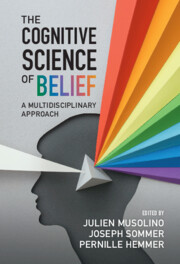Book contents
- The Cognitive Science of Belief
- The Cognitive Science of Belief
- Copyright page
- Contents
- Figures and Tables
- Contributors
- Chapter 1 Introduction
- Part I Understanding Belief
- Philosophical and Linguistic Approaches to Beliefs
- Chapter 2 The Cognitive Science of ‘Belief’ (The Word)
- Chapter 3 The Science of Belief: A Progress Report
- Chapter 4 The Role of Context in Belief Evaluation: Costs and Benefits of Irrational Beliefs
- Models of Optimal Beliefs
- Implicit vs Explicit Beliefs
- Evolutionary Psychology of Beliefs
- Part II Domains of Beliefs
- Part III Variation in Beliefs
- Index
- References
Chapter 3 - The Science of Belief: A Progress Report
from Philosophical and Linguistic Approaches to Beliefs
Published online by Cambridge University Press: 03 November 2022
- The Cognitive Science of Belief
- The Cognitive Science of Belief
- Copyright page
- Contents
- Figures and Tables
- Contributors
- Chapter 1 Introduction
- Part I Understanding Belief
- Philosophical and Linguistic Approaches to Beliefs
- Chapter 2 The Cognitive Science of ‘Belief’ (The Word)
- Chapter 3 The Science of Belief: A Progress Report
- Chapter 4 The Role of Context in Belief Evaluation: Costs and Benefits of Irrational Beliefs
- Models of Optimal Beliefs
- Implicit vs Explicit Beliefs
- Evolutionary Psychology of Beliefs
- Part II Domains of Beliefs
- Part III Variation in Beliefs
- Index
- References
Summary
The empirical study of belief is emerging at a rapid clip, uniting work from all corners of cognitive science. Reliance on belief in understanding and predicting behavior is widespread. Examples can be found, inter alia, in the placebo effect, attribution theory, theory of mind, and comparative psychological literatures. Research on belief also provides evidence for robust generalizations, including about how we fix, store, and change our beliefs. This article provides the first detailing of the psychofunctionalist account of belief. The picture of belief that emerges is one where belief fixation is automatic and effortless, and independent of controlled and effortful belief rejection. Belief is then stored in fragmented networks of causally isolated, context-sensitive databases. Finally, beliefs can be changed by two distinct updating systems, with one hewing to more or less normatively appropriate methods of Bayesian updating, and the other relying on a psychological immune system, which functions to guard our most centrally held beliefs from potential inconsistency with newly formed beliefs. Understanding belief’s role in our cognitive economy allows us to illuminate broader real-world issues such as how fake news, propaganda, and brainwashing exploit our psychology of belief, and how best to construct our modern informational world.
Keywords
- Type
- Chapter
- Information
- The Cognitive Science of BeliefA Multidisciplinary Approach, pp. 55 - 91Publisher: Cambridge University PressPrint publication year: 2022
References
- 2
- Cited by

